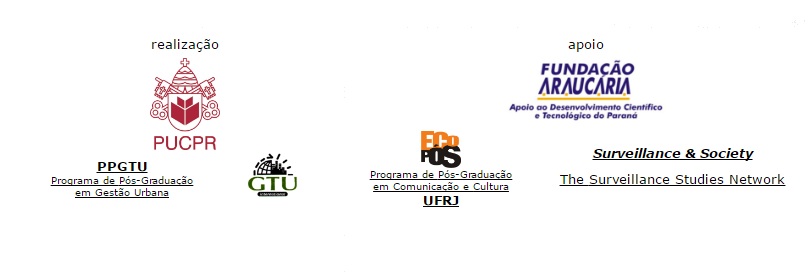
WATCH THE VIDEOS WITH THE KEYNOTE TALKS [CLICK HERE]
DOWNLOAD THE PROCEEDINGS [CLICK HERE]
MORE INFORMATIONS, [CLICK HERE]
In Curitiba…
The symposium, considered the first of its kind in Latin America, took place in Curitiba at PUCPR, in March 2009. Thirty-three papers were presented in Portuguese, Spanish and English, and this was the first successful attempt to kick-off a Latin American network of Surveillance Studies. Keynote speakers included notorious names such as: David Lyon (Queen’s University), Nelson Arteaga Botello (UAEMex), David Murakami Wood (Newcastle University) and Luiz Antonio Machado da Silva (IUPERJ).
After the event, Rodrigo Firmino (PPGTU/PUCPR), Fernanda Bruno (Eco-Pós/UFRJ), Marta Kanashiro (LabJor/UNICAMP), Nelson Arteaga Botello, Danilo Doneda (FDC) and André Lemos (UFBa), with the help of David Lyon and David Murakami Wood, got together to define the beginning of the Latin American Network. Thus, this symposium has marked the start of a new time in terms of academic and professional relationships about surveillance studies in Latin American countries. The proceedings are the testimonium of this important moment and are available for free in this website. Here is a nice post-event comment by David Murakami Wood on his Blog “notes from the ubiquitous surveillance society”:
Surveillance in Latin America
Nelson Arteaga Botello is now organising the next event, to take place in Mexico, hosted by the Universidad Autonoma del Estado de Mexico, in 2010.
Background…
Surveillance has become a major subject in the social sciences, and Surveillance Studies an important interdisciplinary field of study. Yet, the subject remains dominated by perspectives from the Global North. The idea of the ‘surveillance society’ is essentially a Euro-American concept, little tested or explored outside of those countries, yet it is in the Global South where surveillance and social control have far more direct and visceral impacts on lives and livelihoods.
In Latin America in particular, the practices and technologies of surveillance have had a dominating effect in the recent past, with many nations experiencing long periods of authoritarian rule, and years of violent struggle between rival ideologies, each of which has imposed it own kind of control on areas of influence and supporters. These years have left a legacy within the practices of security services and the attitudes of peoples towards states that has still not been resolved in several countries.
At the same time, significant foreign monitoring, and indirect and direct intervention, particularly from the United States of America, has imposed yet another layer of surveillant control. This remains a key factor in areas like the ‘war on drugs’ in Colombia and Central America, the control of the movement of populations, in particular immigration to the USA, and the political ecological struggle over the Amazon region. Now, with new tools of urban surveillance, in particular CCTV and the electronic database, the state and private corporations are both implicated in new kinds of surveillance and control, justified through the growing middle classes’ concern about crime, and the effects of regional and international terrorism and the US ‘war on terror’.
With a range of scholars, analysts and activists from Latin America and beyond, this workshop aims to open up the past, present and future of surveillance, security and social control in the region to critical scrutiny and establish the key questions for research and politics.
Organising Committee:
Dr Rodrigo Firmino
[Postgrraduate School of Urban Development, Pontifical Catholic University of Parana, Curitiba, Brazil]
Dr Fernanda Bruno
[Postgraraduate School of Communications, Federal University of Rio de Janeiro, Brazil]
Marta Kanashiro
[Laboratory of Advanced Studies in Journalism, State University of Campinas (UNICAMP) Campinas, Brazil]
Dr Nelson Arteaga Botello
[Faculty of Political Science, Autonomous State University of Mexico]
Dr David Murakami Wood
[Global Urban Research Unit, Newcastle University, UK; Visiting Scholar, Pontifical Catholic University of Parana]

